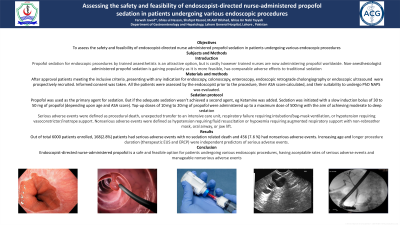Tuesday Poster Session
Category: General Endoscopy
P3390 - Assessing the Safety and Feasibility of Endoscopist-Directed Nurse-Administered Propofol Sedation in Patients Undergoing Various Endoscopic Procedures
Tuesday, October 24, 2023
10:30 AM - 4:00 PM PT
Location: Exhibit Hall

Has Audio
- FJ
Farwah Javed, MBBS
Lahore General Hospital
Lahore, Punjab, Pakistan
Presenting Author(s)
Farwah Javed, MBBS, Ghias Un Nabi, MRCP, MD, Shafqat Rasool, MBBS
Lahore General Hospital, Lahore, Punjab, Pakistan
Introduction: Propofol sedation for endoscopic procedures by trained anaesthetists is an attractive option, but is costly however trained nurses are now administering propofol worldwide. Non-anesthesiologist administered propofol sedation is gaining popularity as it is more feasible, has comparable adverse effects to traditional sedatio
Methods: After approval patients meeting the inclusive criteria ,presenting with any indication for endoscopy, colonoscopy, enteroscopy, endoscopic retrograde cholongiography or endoscopic ultrasound were prospectively recruited. Informed consent was taken. All the patients were assessed by the endoscopist prior to the procedure, their ASA score calculated, and their suitability to undergo PhD NAPS was evaluated.Sedation protocol:
Propofol was used as the primary agent for sedation. But if the adequate sedation wasn’t achieved a second agent, eg Ketamine was added. Sedation was initiated with a slow induction bolus of 30 to 50 mg of propofol( depending upon age and ASA score). Top-up doses of 10 mg to 20 mg of propofol were administered up to a maximum dose of 500 mg with the aim of achieving moderate to deep sedation
Serious adverse events were defined as procedural death, unexpected transfer to an intensive care unit, respiratory failure requiring intubation/bag-mask ventilation, or hypotension requiring vasoconstrictor/inotrope support. Nonserious adverse events were defined as hypotension requiring fluid resuscitation or hypoxemia requiring augmented respiratory support with non-rebreather mask, oral airway, or jaw lift.
Results: Out of total 6000 patients enrolled, 168(2.8%) patients had serious adverse events with no sedation related death and 456 (7.6 %) had nonserious adverse events. Increasing age and longer procedure duration (therapeutic EUS and ERCP) were independent predictors of serious adverse events.
Discussion: Endoscopist-directed nurse-administered propofol is a safe and feasible option for patients undergoing various endoscopic procedures, having acceptable rates of serious adverse events and manageable nonserious adverse events
Disclosures:
Farwah Javed, MBBS, Ghias Un Nabi, MRCP, MD, Shafqat Rasool, MBBS. P3390 - Assessing the Safety and Feasibility of Endoscopist-Directed Nurse-Administered Propofol Sedation in Patients Undergoing Various Endoscopic Procedures, ACG 2023 Annual Scientific Meeting Abstracts. Vancouver, BC, Canada: American College of Gastroenterology.
Lahore General Hospital, Lahore, Punjab, Pakistan
Introduction: Propofol sedation for endoscopic procedures by trained anaesthetists is an attractive option, but is costly however trained nurses are now administering propofol worldwide. Non-anesthesiologist administered propofol sedation is gaining popularity as it is more feasible, has comparable adverse effects to traditional sedatio
Methods: After approval patients meeting the inclusive criteria ,presenting with any indication for endoscopy, colonoscopy, enteroscopy, endoscopic retrograde cholongiography or endoscopic ultrasound were prospectively recruited. Informed consent was taken. All the patients were assessed by the endoscopist prior to the procedure, their ASA score calculated, and their suitability to undergo PhD NAPS was evaluated.Sedation protocol:
Propofol was used as the primary agent for sedation. But if the adequate sedation wasn’t achieved a second agent, eg Ketamine was added. Sedation was initiated with a slow induction bolus of 30 to 50 mg of propofol( depending upon age and ASA score). Top-up doses of 10 mg to 20 mg of propofol were administered up to a maximum dose of 500 mg with the aim of achieving moderate to deep sedation
Serious adverse events were defined as procedural death, unexpected transfer to an intensive care unit, respiratory failure requiring intubation/bag-mask ventilation, or hypotension requiring vasoconstrictor/inotrope support. Nonserious adverse events were defined as hypotension requiring fluid resuscitation or hypoxemia requiring augmented respiratory support with non-rebreather mask, oral airway, or jaw lift.
Results: Out of total 6000 patients enrolled, 168(2.8%) patients had serious adverse events with no sedation related death and 456 (7.6 %) had nonserious adverse events. Increasing age and longer procedure duration (therapeutic EUS and ERCP) were independent predictors of serious adverse events.
Discussion: Endoscopist-directed nurse-administered propofol is a safe and feasible option for patients undergoing various endoscopic procedures, having acceptable rates of serious adverse events and manageable nonserious adverse events
Disclosures:
Farwah Javed indicated no relevant financial relationships.
Ghias Un Nabi indicated no relevant financial relationships.
Shafqat Rasool indicated no relevant financial relationships.
Farwah Javed, MBBS, Ghias Un Nabi, MRCP, MD, Shafqat Rasool, MBBS. P3390 - Assessing the Safety and Feasibility of Endoscopist-Directed Nurse-Administered Propofol Sedation in Patients Undergoing Various Endoscopic Procedures, ACG 2023 Annual Scientific Meeting Abstracts. Vancouver, BC, Canada: American College of Gastroenterology.
